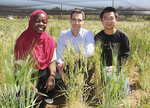World breakthrough on salt-tolerant wheat
A team of Australian scientists involving the University of Adelaide is the first in the world to breed a salt-tolerant variety of durum wheat which shows a 25% improved grain yield in the field. Using 'non-GM' crop breeding techniques, scientists from CSIRO Plant Industry in Canberra have introduced a salt-tolerant gene into a commercial durum wheat, with spectacular results shown in field tests. Researchers at the University of Adelaide's Waite Research Institute have led the effort to understand how the gene delivers salinity tolerance to the plants. The research is the first of its kind to demonstrate the improvement in salt tolerance of an agricultural crop - from understanding the function of the salt-tolerant genes in the lab, to demonstrating increased grain yields in the field. The results were published last month in the journal Nature Biotechnology. The paper's senior author is Dr Matthew Gilliham from the University's Waite Research Institute and the ARC Centre of Excellence in Plant Energy Biology. Lead authors are CSIRO Plant Industry scientists Dr Rana Munns and Dr Richard James and University of Adelaide student Bo Xu. "This work is significant as salinity already affects over 20% of the world's agricultural soils, and salinity poses an increasing threat to food production due to climate change," Dr Munns said. Dr Gilliham said: "Salinity is a particular issue in the prime wheat-growing areas of Australia, the world's second-largest wheat exporter after the United States. With the global population estimated to reach nine billion by 2050, and the demand for food expected to rise by 100% in this time, salt-tolerant crops will be an important tool to ensure future food security." Domestication and breeding has narrowed the gene pool of modern wheat, leaving it susceptible to environmental stress. Durum wheat, used for making such food products as pasta and couscous, is particularly susceptible to soil salinity. However, the authors of this study realised that wild relatives of modern-day wheat remain a significant source of genes for a range of traits, including salinity tolerance. They discovered the new salt-tolerant gene in an ancestral cousin of modern-day wheat, Triticum monococcum. "Salty soils are a major problem because if sodium starts to build up in the leaves it will affect important processes such as photosynthesis, which is critical to the plant's success," Dr Gilliham said. "The salt-tolerant gene (known as TmHKT1;5-A) works by excluding sodium from the leaves. It produces a protein that removes the sodium from the cells lining the xylem, which are the 'pipes' that plants use to move water from their roots to their leaves," he said. Dr James, who led the field trials, said: "While most studies only look at performance under controlled conditions in a laboratory or greenhouse, this is the first study to confirm that the salt-tolerant gene increases yields on a farm with saline soils." Field trials were conducted at a variety of sites across Australia, including a commercial farm in northern NSW. The salt-tolerant wheat will now be used by the Australian Durum Wheat Improvement Program (ADWIP) to assess its impact by incorporating this into recently developed varieties as a breeding line. Story by David Ellis
|





